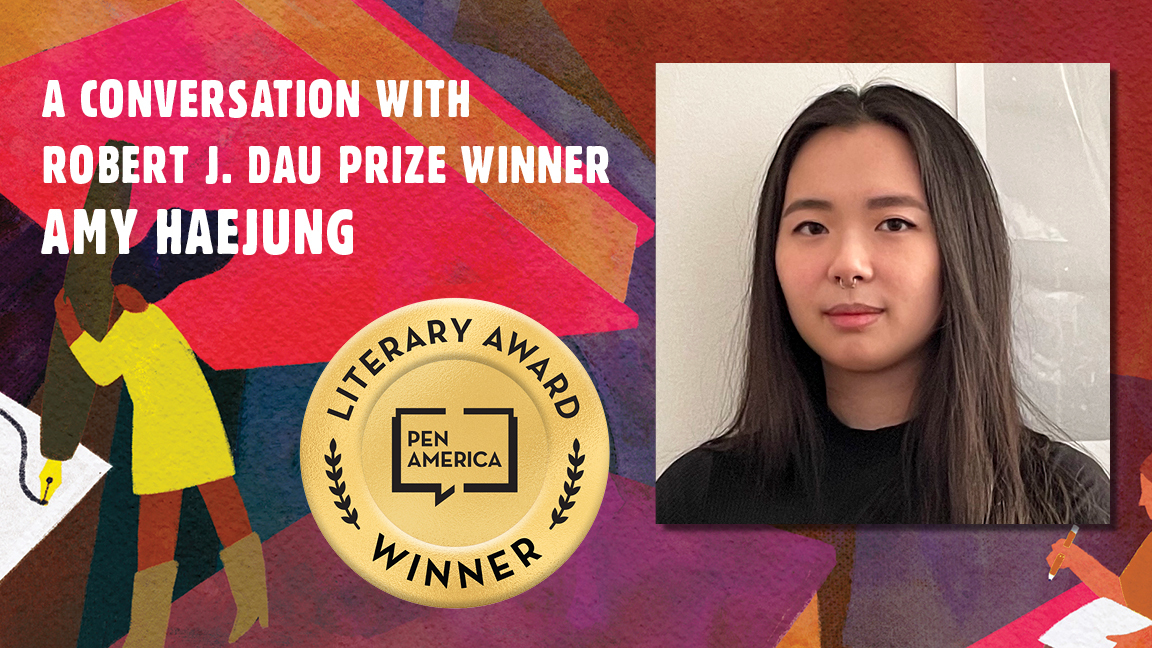Don’t Write Alone Interviews
“The writing process was a bit chaotic”: Robert J. Dau Prize Winner Amy Haejung
Learn about Amy Haejung’s short story “Maria,” which was selected for ‘Best Debut Short Stories 2021.’
Best Debut Short Stories 2021: The PEN America Dau Prize is the fifth edition of an anthology celebrating outstanding new fiction writers published by literary magazines around the world. In the upcoming weeks, we’ll feature Q&As with the contributors, whose stories were selected for PEN’s Robert J. Dau Short Story Prize for Emerging Writers and for the anthology by judges Nana Kwame Adjei-Brenyah, Kali Fajardo-Anstine, and Beth Piatote.
Amy Haejung lives in New York and works as a freelance copy editor and proofreader. She is a 2021 Kweli Emerging Writer Fellow and was a finalist for the 2020 Kundiman Mentorship Lab in fiction.
“Maria” was originally published in Waxwing Literary Journal. Find a brief excerpt below:
The next day the news headlines were all about the moon: theories about its disappearance, scientific fumbling and weird conspiracies and wild speculation. Some people said the moon was tired of looking at us for so many millennia, unable to turn away, tidally locked in a stare to the death, and had finally freed itself. Some said the United States and North Korea had accidentally disintegrated it in competing nuclear explosions. Others said aliens. There was live coverage, breaking news headlines, constant updates for a week and a half, until it became clear that the moon was indeed gone, not merely hidden by some illusive celestial mechanism, and that it wasn’t likely to come back anytime soon or by any human means. Then came the longform essays and thought pieces, hot takes and even eulogies, with titles like “What Does the Moon Mean to Us Now That It’s Gone?” and “In Memoriam: The Illustrated Life of the Moon.”
Where did you find the idea for this story? What was your writing process like?
The writing process was a bit chaotic—at that time my background was mainly in poetry, and I felt like I had no idea how to even begin writing a story. I started with a lot of freewriting; there was some aimless, wandering scene with the narrator going on a walk at night, and the moon’s disappearance came to me somewhat spontaneously. That image was immediately very generative for me and guided the rest of the writing. Once that happened, the draft took around another week to finish.
There are two main through lines in “Maria:” the moon’s unexplained disappearance and the narrator’s struggle to come to terms with growing apart from her friend M. In writing, which of these ideas came to you first? How would you describe their interplay?
After arriving at the moon’s disappearance, a lot of the other elements sort of fell into place, including the arc of the narrator’s friendship with M. I’ve always been interested in the complicated and lasting dynamics of early friendships, but I can’t remember exactly how the figure of M arose—it was definitely afterward, though. I had fun playing around with twinning and reflections, orbits, micro and macro parallels—I wanted these threads to rhyme with and echo each other, building emotional and symbolic resonance.
At one point in the narrative, the narrator dreams about M: “I picked up a pair of scissors and began to cut [her hair], shorter and shorter, sheets of black falling to the floor, and then when she spun around I saw my own face.” What does the narrator find in her friendship with M, and what is lost when the friendship ends?
The narrator views M both in terms of identification and aspiration, intimacy and envy. It’s a fraught but formative friendship that the narrator has, partly unknowingly, built her identity around; losing this close relationship hurts on an interpersonal level, but also feels like losing a crucial point of reference, one that the narrator remains haunted by.
At the end of “Maria” the narrator realizes that her emotional turmoil over falling out of touch with M arises from “the version of [M] that lived between my brain and my skull, grew into my mind.” What role does the narrator play in fueling her own longing? If the narrator and M were to reconnect in real life, would it help the narrator attain some sort of resolution? Why or why not?
Despite the narrator’s longing, I think she wouldn’t seek out, and might actively avoid, reuniting with M in real life. She’s aware that her memories of M are distorted, and that M’s perceived significance has outgrown reality—meeting again would likely result in disillusionment, which would constitute a second, perhaps greater loss. For better or for worse, she prefers to feed off the imaginative possibilities of uncertainty.
How has the Robert J. Dau Prize affected you?
It was a huge shock at first—very surreal! I had no idea what to expect sending this story out into the world, and it’s been such a strange, exciting journey. It’s been a joy and honor to join such a lovely, talented cohort of new writers, and I’ve felt so welcomed by the literary community. I’m so grateful to everyone who has read my story and helped bring it into the world (especially in my writing group and at Waxwing and Catapult).
What’s the best or worst writing advice you’ve ever received and why?
For me the best writing advice, even when I’ve resented it, has always been to just write. This past summer I attended a craft talk by Asali Solomon as part of Kweli’s International Literary Festival, and she put it more or less like this: You have to write, and thinking, even thinking about writing, is not the same thing as writing.
Finally, where do you discover new writing?
I love getting reading recommendations from friends. I also like to check issues of my favorite literary magazines, and Twitter.
